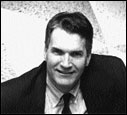![]()
![]()
![]()
![]()
![]()
![]()
A Renaissance at
the Library
Healthier Collections, Improved Staff Morale Are Signs of Better Times
By Cathy
Cockrell, Public Affairs
Posted October 6, 1999
|
|
|
Now, said Imani Abalos, head of research and information services at Doe, "the 7,500 volumes that we took out have to go back in." She hopes to see that accomplished "quickly, but quietly," and then to help re-establish the second-floor help desk, where reference specialists field more than 23,000 inquiries a year.
"You no longer think that you're in the middle of a seismic experiment," Professor Tom Leonard, chairman of the Academic Senate Library Committee, said of recent changes at Doe. "It looks like a library."
A Sense of Optimism
For Abalos, Leonard and others associated with the library, the re-opening of the North Reading Room is but one sign of better times, after a decade of downsizing and demoralization, then the shaking, dust and dislocation of seismic work at Doe.
During budget cuts in the '90s, James Spohrer, acting associate university librarian and director of collections, kept a wish list of items he thought he'd never be able to purchase.
The chancellor's commitment of $5.5 million in additional funding over three years, and fund-raising efforts by the campus and the library, have changed the situation, Spohrer said.
He and others in charge of collections have been able to fill in gaps and, "for the first time in a decade," he said, "to systematically consider purchase of large sets of information."
"As recently as two years ago, there was a great deal of desperation and helplessness, as we watched the collections slide into mediocrity," Spohrer noted. "There's now a sense not only of light at the end of the tunnel, but that we've gotten out of the tunnel."
Lowell's Initiatives
Changes initiated by University Librarian Gerald Lowell since his arrival last December have also marked a sea change at the library.
"He's a very upbeat, encouraging, enthusiastic person," said Ellen Meltzer, head of the Teaching Library, "so it's changed the tone of the library."
|
|
|
Lowell has focused on opening up the budget planning process and on building a new senior team. By the beginning of next year, he hopes to have in place three new associate university librarians, who will head up public services, Doe/Moffitt, and collections.
"We've done quite well in recovering as it relates to collections," said Lowell. "The Chancellor's Initiative has helped immensely. On the operations side of the house -- staff and salaries -- we're slowly getting back on our feet."
When Lowell started, staff morale had hit a low. "Much of my initial work was healing," Lowell recalled.
Last spring, the library collaborated with psychology Professor Christina Maslach, an expert on job stress and burnout, to survey staff on job stress and job satisfaction. Participation was voluntary and anonymity was assured. The response was phenomenal: 93 percent participated, 38 percent wrote comments.
Staff responded with such enthusiasm, Abalos believes, because they perceived that "someone was interested in improving staff morale and was not going to rely on rumor an anecdotes.
"It's so different from anything we've ever had," she said of the leadership. "This is a really different feel."
A new organizational culture committee now meets weekly to help develop ways for staff to better support each other.
Staffing issues are also on the table. Between 1989 and 1997, the library lost 38 percent of its professional librarians and cut the pay of the lowest-paid positions, filled by students, by a dollar.
In July, student assistants got a pay raise -- from $6.50 an hour back up to $7.50. "We're looking forward to keeping more of them around awhile," Wanat said of student workers at the engineering library. "We're not into a constant retraining cycle."
The library is also starting to examine the pent-up need for professional expertise. "We have begun examining our vacancies," Spohrer said. "Not just one-for-one filling positions, but ... where does it make most sense [to hire], given changes in the campus academic programs and changes in the library itself?"
Lowell plans to launch a detailed user survey of faculty and graduate students this academic year, and to work on making it easier for library patrons to find the materials they need.
A new service permits faculty and grad students to initiate requests for books from other UC libraries directly via computer, without going to interlibrary loan offices. Requests for journal articles will be added next year.
Such initiatives are not lost on faculty. "You get a sense from campus that the library has a greater consumer happiness orientation," Leonard, chairman of the Academic Senate Library Committee, said.
"Even with the chancellor's generosity," he cautioned, "the budget is not sufficient to catch up with ground lost in the '90s."
But the improved health of the collections and progress in hiring a new management team have allowed his committee, Leonard said, to return to "little things that matter a lot to library patrons" -- "basic questions" such as how to make browsing easier, creating "truly quiet" places in the library, and making its Web site more user friendly.
New Services
Through a new service, MELVYL Request, faculty and graduate students may initiate requests for books from other UC libraries directly via computer.
Faculty are again encouraged to contact subject librarians to suggest important additions to the collections).
The California Digital Library, a collaborative effort of the UC campuses, now provides access to a wide variety of databases, journal articles and other scholarly resources.
![]()
![]()
October 6 - 12,
1999 (Volume 28, Number 9)
Copyright 1999, The Regents of the University of
California.
Produced and maintained by the Office
of Public Affairs
at UC
Berkeley.
Comments? E-mail berkeleyan@pa.urel.berkeley.edu.

